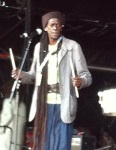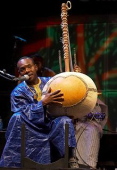 WOMAD line ups never fail to excite and this year was no different. It distinguishes itself from the rest of the festival circuit by being more inclusive and contemporary; other festivals either pride themselves on being of a certain era (Reload, etc) or tolerate a high proportion of artists now on the chicken-in-a-basket gig circuit. Any veterans playing here had better still be hitting their stride.
WOMAD line ups never fail to excite and this year was no different. It distinguishes itself from the rest of the festival circuit by being more inclusive and contemporary; other festivals either pride themselves on being of a certain era (Reload, etc) or tolerate a high proportion of artists now on the chicken-in-a-basket gig circuit. Any veterans playing here had better still be hitting their stride.
A well organised affair, even the rain didn’t stop play with Bellowhead on the main stage on Friday, they played their optimistic blend of folk-rock that started the umbrella dances. Attendance was down for campers as some opted to just come for the day on sunny Saturday.
Saturday was therefore a different story weather wise and the energy lifted. Hassam Ramzy from Egypt delivered smooth, soundtrack-ready grooves.
Cheikh Lo was surprisingly first up on the main stage, and having got there early, we were treated to an extended sound-check with all of the band. He came on and the clouds parted. According to the radio coverage, Cheikh brought a hair-drier with him, not to dry his now knee-length dreads, but to warm his hands. Although only five albums in, he has toured Europe extensively over the years (especially France and the UK) so he knew to come prepared for British Summer Time. I caught him at London’s Jazz Café in the mid-nineties and had a great time in the half empty venue; years later, Cheikh Lo now commands the size of audience he deserves.
A man pushed his way to the front next to me, then said, ‘Who is this guy, is he any good?’ I would have forgiven him except he stood for most of the set with a finger in one ear and his phone clamped to the other. In Dakar, where Cheikh Lo has both a street and bus stop named in his honour, there is no doubting who this humble man of the people is.
Here he treated us to a set that was neither promoting his new album particularly, nor a greatest hits package, just dancey Afro-Cuban Jazz as he refers to it. Perhaps he was rather restricted from playing much of his recent release “Balbalou”, as he didn’t have his vocal collaborators from that album with him and was short of an accordion, kora and piano on stage. Cheikh, himself a talented multi-instrumentalist, played high-hat and guitar at the front, before evicting his kit drummer to take it on himself for a couple of songs. Tracks from the album he did play included the title track, “Balbalou” and the wonderfully stop/start “Gemou Ma Ko”, a rarer love song. Live, Cheikh Lo is blessed with as many grace notes as grace-pauses to underline his rhythms. The translations of his song titles sound like a manifesto for peaceful change: “The Pacifist”, “The Truth”, “Enough of Revolutions”, “Lower The Weapons”, and so on. There is no fist in the air however, just pretty melodies and hip-swinging rhythms.
After over an hour of wonderful Senagalese music, I went to meet him to get my CD signed, I only managed a hurried, ‘Merci beaucoup’ as I shook his soft hand. He wrote on the CD “Good vibes” which summed up the whole experience.
 Toumani and his son Sidiki, come from a long line of griots, from Mali and they can trace back the family line an impressive 72 generations, all kora players, the knowledge passed from father to son for centuries. Their instrument, the kora, or African harp to some has 21 strings and in the hands of a master, emits cascades of beautiful sound. The new album, ‘Toumani & Sidiki’ is rich in texture and melodies and the playing bright and clear, there is none of the squeak or scratch of strings as with a lesser player. The strings are tickled, strummed or stroked into torrents of bells, lutes or piano, or there is more attack and the tones ring out; it is a flawless album but it is certainly not clinical. Curiously, it is simultaneously stimulating and relaxing so I was looking forward to an inspiring evening listening to them live.
Toumani and his son Sidiki, come from a long line of griots, from Mali and they can trace back the family line an impressive 72 generations, all kora players, the knowledge passed from father to son for centuries. Their instrument, the kora, or African harp to some has 21 strings and in the hands of a master, emits cascades of beautiful sound. The new album, ‘Toumani & Sidiki’ is rich in texture and melodies and the playing bright and clear, there is none of the squeak or scratch of strings as with a lesser player. The strings are tickled, strummed or stroked into torrents of bells, lutes or piano, or there is more attack and the tones ring out; it is a flawless album but it is certainly not clinical. Curiously, it is simultaneously stimulating and relaxing so I was looking forward to an inspiring evening listening to them live.
The concert had been rescheduled to the end of their UK tour after visa problems prevented their appearance at the Brighton Festival, of which this is part. I have seen Toumani in action with a band at Womad a couple of years ago, but I was looking forward to seeing him with just his son.
Sidiki took the stage first and played alone for the first song, as if to prove his own virtuosity ahead of the appearance of his father, and what a highly skilled musician he is in his own right. Toumani then appeared to rapturous applause and settled behind his slightly smaller instrument. Father and son played so intuitively, mainly with eyes shut and they navigated the sophisticated melodies like fish in a shoal turning together. Only twice Toumani shouted out a command to his son, perhaps to play louder, otherwise it was complete simpatico.
Just when I thought a melodic theme would be repeated, it would be explored and ultimately taken further. There were runs and climaxes in the tunes, Toumani and Sidiki taking it in turns to either hold down the song or take flight in their soloing. I don’t know the album well enough yet to have picked out the titles of songs, and all of the tracks being instrumentals made it harder still, but I did recognise much of the performance from the CD, although some of the tracks were longer than the studio versions. Toumani is renowned for not doing rehearsals but just turning up and letting the magic happen; in fact it was more like the music flowed through them rather than coming from them per se.
I was shocked when the pair took a bow after an hour and the crowd took to their feet in a grateful ovation; it only felt like 20 minutes had passed. Toumani, a man of few words, addressed the audience at last greeting Brighton and saying he loves the city and that he would be back. He also raised awareness of the continuing troubles in his home country and dedicated the encore to the victims of the Lampedusa boat tragedy. When I got my CD signed afterwards, I shook their gifted hands and thanked them but forgot to ask if they felt their ancestors were with them while they played; I bet they were there. The CD “Toumani & Sidiki” is out now and comes highly recommended.


